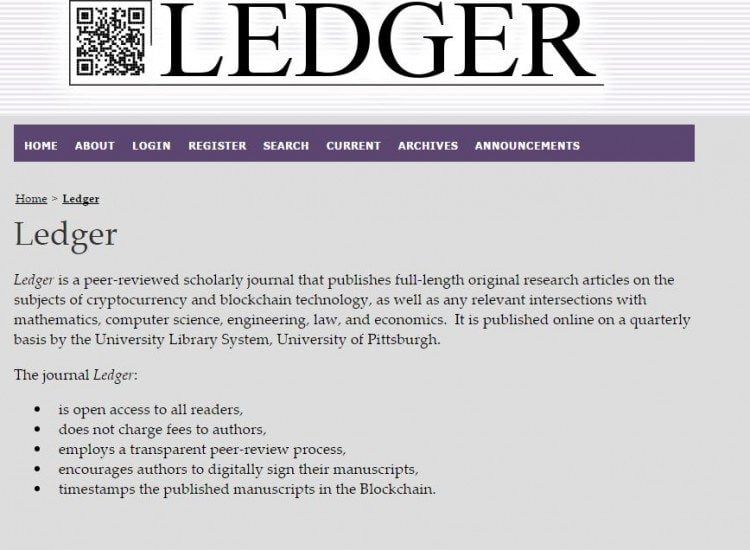Reason to trust

How Our News is Made
Strict editorial policy that focuses on accuracy, relevance, and impartiality
Ad discliamer
Morbi pretium leo et nisl aliquam mollis. Quisque arcu lorem, ultricies quis pellentesque nec, ullamcorper eu odio.
Ledger is a peer-reviewed scholarly journal dedicated to publishing full-length original research articles on the centered on cryptocurrencies and the blockchain technology. The Journal is published online by the University of Pittsburgh on a quarterly basis. The publication also covers any relevant intersections with computer science, mathematics, law, engineering, and economics.
The journal Ledger is freely accessible to all readers and authors. It encourages authors to digitally sign their manuscripts and timestamp the published manuscripts in the Blockchain. The Journal does this without charging fees to the authors. Ledger tries to foster transparency, and before any publication of an article, Ledger will embed the hash of the final paper within the Blockchain, and the owner will be required to sign it.
Ledger employs a transparent peer-review process; In comparison to other Journals, Ledger seems to have adopted an attitude of unbiased critical appraisal throughout the academic process that render them a sophisticated “peer-reviewed” journal for cryptocurrencies.
Ledger has designed a peer review system, where reviews can be freely published by authors. The Journal ensures that reviewers can publish their feedback, while holding them accountable for their reviews.
As it charges no fees for publishing papers, distribution or access, the Ledger has a clear financial business problem. It (probably) relies entirely on two sources: the volunteer time of reviewers, and the paid salary of academics.
Ledger will be a direct competitor to the Financial Cryptography (the conference). Bob Hettinga, the founder of Financial Cryptography, made it clear that this was a competitive market. However, Ledger goals are more aimed at the process of paper distribution itself, apart from presentation-oriented and networking.
The Journal still doesn’t count with any publication and is inviting authors to submit their original research for the inaugural issue of the very first peer-reviewed academic publication dedicated to the field of cryptocurrencies. Digital currency studies haven’t been comfortably accepted in any traditional journal, and that’s why Ledger saw a niche where it could expand and create the first purpose-built vehicle for the leading research in the field.
Ledger is calling for papers for the inaugural issue. These are not limited to the social, economic, philosophical aspect of digital currency or any technical development and the implications of Bitcoin. Ledger also embraces a larger field of study. Submissions must be of up to four thousand words and should detail new ideas on any relevant topic.
Interested authors should consult the submissions and policies sections on the Ledger website. The deadline for submissions is 31 December 2015.



























